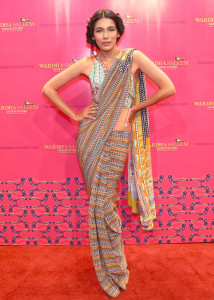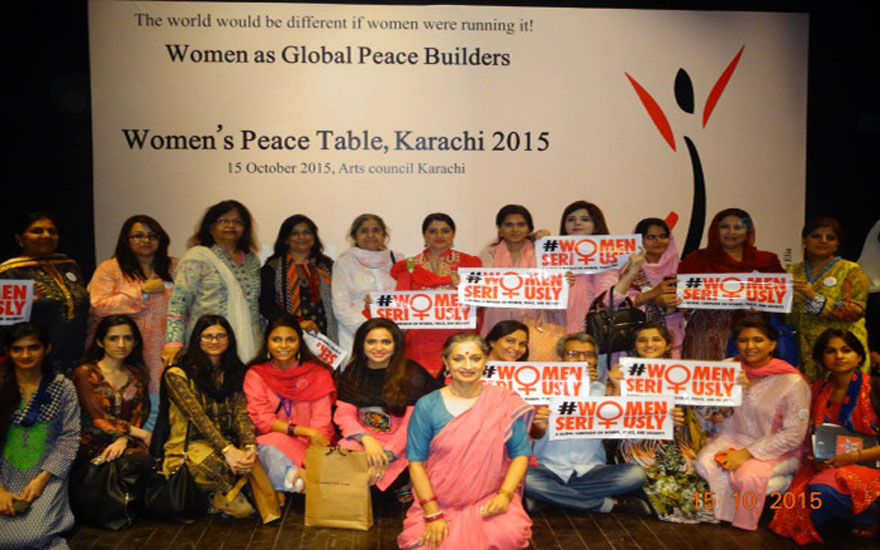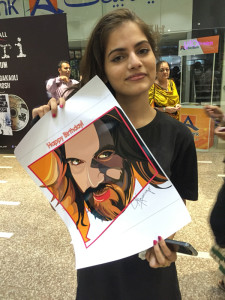Out and About — November
By Newsline Admin | Newsliners | Published 10 years ago
The Art of Soul
Last month, Karachi’s Institute of Business Administration (IBA) launched a collection of Sadequain’s work to celebrate the institute’s 60th anniversary. Sibtain Naqvi, Sadequain’s grandson, presided over the evening, while a panel of speakers gave presentations on the artist’s mysterious and disturbing works.
Ishrat Husain, the dean of IBA, spoke about the commendable work the institution is doing in promoting the arts, but it was F.S Aijazuddin’s talk that was really illuminating. Structured like an art seminar, he deconstructed Sadequain’s huge repertoire of work by pointing out how it reflected the artist’s intrinsic personality and oeuvre: masochist, narcissist, genius, painter, poet and calligrapher. He also demonstrated how Sadequain’s work was sometimes reminiscent of Salvador Dali, and other times of Pablo Picasso. He wove all this information together by placing it in a historical context, for example, Sadequain’s Christian period, which was depicted in motifs appearing in virtually all his work during that time.
Niilofur Farrukh then took the stage and spoke about Sadequain’s poetry. The ultimate romantic, Sadequain found many muses through his life and they inspired the most beautiful, if erotic, paintings and poetry. But also, deep and brooding as he was, much of Sadequain’s work was powerful, sometimes political, and often ominously disturbing.
The finale of the event was to be Talat Hussain reciting Sadequain’s rubaiyat, but unfortunately, he was unprepared. So a poorly-recited rubaiyat and a poor replacement: an anecdote about his time spent with Sadequain.
The upside: introducing Generation Next to Pakistan’s most pioneering — and arguably greatest — master.
— Atiya Abbas
New Kid on the Block
 It seems as though a new designer studio crops up every other day in Pakistan, and so it was when Wardha Saleem launched her design studio last month with the whole shebang: red carpet, models, local celebrities and designers, and even an appearance by politician Sharmila Faruqi, with her mother in tow.
It seems as though a new designer studio crops up every other day in Pakistan, and so it was when Wardha Saleem launched her design studio last month with the whole shebang: red carpet, models, local celebrities and designers, and even an appearance by politician Sharmila Faruqi, with her mother in tow.
The studio, located in Clifton, has been designed by Alavi Designs, and has an artsy aesthetic: a range of handmade flying birds suspended from the ceiling, hand-carved jafris, antique cabinets and block-printed panels.
Saleem’s range of clothing varies from prêt, luxury prêt, and formals, to bridal ensembles. Prices range from Rs. 3,500 and up for prêt wear, and Rs. 12,500 for luxury prêt. Her selection includes printedkurtis, silk jackets which are perfect for a chic look in Karachi’s hot summer months, digital print silk saris, and heavily-worked formals and laser-cut capes.
The event featured a presentation by models dressed to the nines in Wardha Saleem, strutting about the newly-designed store, and posing for the red carpet. There were different sections in the design studio where attendees could sample miniature treats, sip on refreshing mocktails, and even take photographs. Spotted at the event were designers Maheen Khan and Shehla Chatoor, hair-stylist Laiqa Hasan, photographer and jeweler Tapu Javeri and make-up guru Saba Ansari.
— Raisa Vayani
Karachi Women’s Table Talks

On October 15, about 85 women, dressed in pink for peace, arrived at Karachi’s Arts Council for the ‘Women Peace Table Karachi 2015’ hosted by Tehrik-e-Niswan. The first half of the day was a participatory session to allow attendees to interact and discuss women’s representation in various spheres and forums. This event hosted by Sheema Kirmani was part of a global campaign of ‘PeaceWomen Across the Globe’ under the auspices of ‘Women Seriously’ whose website quotes, “If you are serious about peace, you have to take women seriously.”
On that day, a similar event was taking place in 20 other countries. The premise behind this campaign is that women by nature have a different way of relating to issues and conflict than men, and are under-represented in peace-and policy-making decisions that affect their lives. Despite being half of humanity, women’s own perspective and leadership is missing in issues faced by them and these are not even discussed when such matters come up, despite countless examples of them being equally capable of determining, presiding and governing.
The Women’s Peace Tables organised around the world are meant to symbolise and represent women’s perspective and leadership in peace negotiations, public policy and in decision-making roles. Their collective and consolidated voice is aimed to jump-start a movement to shape a Women’s Global Peace Agenda. The format of the conference in Karachi was informal yet intense, with the first half exclusively for women — engaging both young and veterans alike in discussions and analyses of women’s status and representation in Pakistan in the context of violence, education, economy and in politics, public policy and decision-making.
Zubeida Mustafa and Baela Raza Jamil spoke in detail of the current education crisis, not just for girls, but for boys as well. They cited various reports, including that of Alif Ailaan’s, an NGO, which states that about 25 million children are either not in school or have left their education. They also provided facts and figures and pointed out various causes of the nationwide education disparity between the genders. Zubeida Mustafa gave the example of three countries where women played important roles as peace negotiators in long-term conflicts: Columbia, Burundi and the Philippines. She related how their efforts bore fruit in establishing peace.
Nuzhat Shirin spoke on the subject of women’s economic empowerment. She dilated on the various cultural and official blockages that stymie this at every step. She gave examples of women working in the informal sector; namely home-based women workers who are not recognised as part of the labour force by the Bureau of Statics. She pointed out how difficulties in mobility factor into employment opportunities, particularly for female domestic and factory workers.
Dr Habiba Hasan gave an overview of gender-based violence in Pakistan and said that in 2011, the Thomson Reuters Foundation had found Pakistan the third most violent country for women. She gave the three main causes for this: Pakistan’s ethos of being a male-dominated society; laws like the Hudood Ordinance and cultural practices like karo-kari, and the fact that the state regards a woman’s testimony equivalent to half of a man’s. All forms of violence currently prevalent were discussed, ranging from selling women into bondage, sexual harassment and women being forced to bear children numerous times. She said even judges showed an anti-woman bias. As a result she and Justice Nasir had begun training judges and the police in gender sensitisation. From 2016, this course will be also be part of the LLB students’ curriculum.
Other speakers discussed the dismal representation of women in politics and even less representation in decision-making roles. They discussed how even those women who were elected usually owed their success to their male family members who were in politics. They had very little power in their own right.
The session was made even more interesting with poetry recitations and readings, including one by Zahida Hina; songs, a skit and a play called ‘Raisa Ka Ramzan.’ Tributes were also paid to Kainat Sumroo, Ansu Kohli and Humaira Bachal for their struggles.
– Deneb Sumbul
Noori Reincarnated
To the joy and surprise of many, Noori the band has finally resurfaced. They are back with an album, Begum Gul Bakaoli Sarfarosh, that they believe demonstrates how their music has “thematically evolved” since their last work Suno Kay May Hoon Jawan in 2003. The much-awaited launch was held at The Ocean Mall on October 10. The album was launched in Lahore on October 9 and Islamabad on October 11. The artists were greeted by dozens of eager and impatient fans, who haven’t lost any of their enthusiasm for the band.
Nostalgia permeated the event as Ali Noor and Ali Hamza discussed the album and their thinking behind it. The album is named after a woman who migrated to Pakistan at the time of Partition. It showcases a more mature side to Noori, which is perhaps inevitable after such a long hiatus. The album launch was a testament to the fact that Noori are here to stay and ready to adapt to a changing music environment. It is a sign of the relevance of Noori that the album was not only received with acclaim but was launched by Patari, the new online music streaming service. Copies of the album will not be available in stores and can only be purchased at band events or streamed online. Along with giving a jolt to the artistic community, Noori also seems intent on disrupting the archaic model of record distribution.
— Fatima Hashmi
 To the joy and surprise of many, Noori the band has finally resurfaced. They are back with an album, Begum Gul Bakaoli Sarfarosh, that they believe demonstrates how their music has “thematically evolved” since their last work Suno Kay May Hoon Jawan in 2003. The much-awaited launch was held at The Ocean Mall on October 10. The album was launched in Lahore on October 9 and Islamabad on October 11. The artists were greeted by dozens of eager and impatient fans, who haven’t lost any of their enthusiasm for the band.
To the joy and surprise of many, Noori the band has finally resurfaced. They are back with an album, Begum Gul Bakaoli Sarfarosh, that they believe demonstrates how their music has “thematically evolved” since their last work Suno Kay May Hoon Jawan in 2003. The much-awaited launch was held at The Ocean Mall on October 10. The album was launched in Lahore on October 9 and Islamabad on October 11. The artists were greeted by dozens of eager and impatient fans, who haven’t lost any of their enthusiasm for the band.
Nostalgia permeated the event as Ali Noor and Ali Hamza discussed the album and their thinking behind it. The album is named after a woman who migrated to Pakistan at the time of Partition. It showcases a more mature side to Noori, which is perhaps inevitable after such a long hiatus. The album launch was a testament to the fact that Noori are here to stay and ready to adapt to a changing music environment. It is a sign of the relevance of Noori that the album was not only received with acclaim but was launched by Patari, the new online music streaming service. Copies of the album will not be available in stores and can only be purchased at band events or streamed online. Along with giving a jolt to the artistic community, Noori also seems intent on disrupting the archaic model of record distribution.
— Fatima Hashmi


